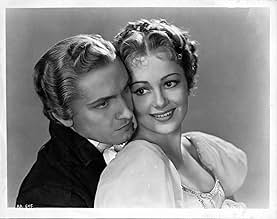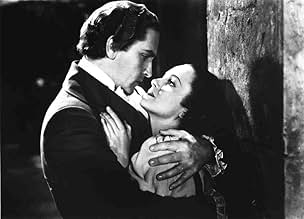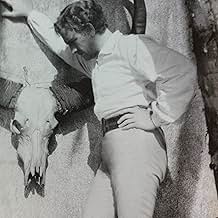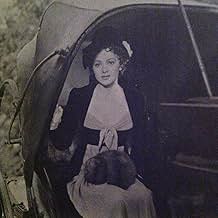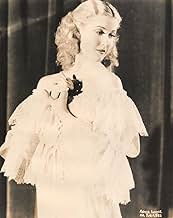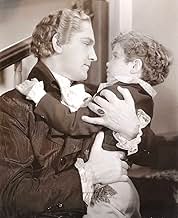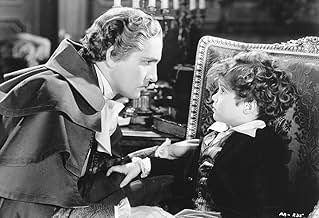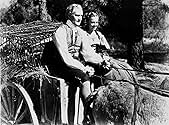IMDb RATING
6.3/10
2.1K
YOUR RATING
In 18th-century Italy, an orphan's debt to the man who raised him threatens to separate him forever from the woman he loves.In 18th-century Italy, an orphan's debt to the man who raised him threatens to separate him forever from the woman he loves.In 18th-century Italy, an orphan's debt to the man who raised him threatens to separate him forever from the woman he loves.
- Won 4 Oscars
- 8 wins & 3 nominations total
Featured reviews
Fredric March stars as the title character, an orphan boy discarded due to his illegitimacy, who overcomes much adversity throughout his life. He is raised in a convent and adopted by a wealthy merchant, Edmund Gwenn, at the age of ten. He learns the business, but is shipped to Havana around the time of the French Revolution. Before he departs, it is learned that he has married the daughter of a servant, Olivia DeHavilland. He is thought lost at sea by all, but is actually in Africa running a slave trade, with his heart blackening the whole time. From there, the tale takes many twists as Anthony must find goodness in his heart again, and DeHavilland may be the key. The drama is a bit heavy-handed and some overacting is present. Claude Rains and Gale Sondergaard make great antagonists, and Sondergaard won a Best Supporting Actress Oscar for her performance.
Hervey Allen (1889-1949) spun quite an elaborate, sweeping 18th-19th century yarn in the form of a gigantic novel, published in 1933, called "Anthony Adverse." It became a best-seller, and three years later Warner Bros. brought it to the screen, directed by Mervyn LeRoy.
The film was very long, comprehensive, and romanitc, in Allen's quasi-Dumas-Dickens-Tolstoy style.
Heading the cast were four of the screen's finest actors, leading players Fredric March and Olivia de Havilland; and supporting character players Claude Rains and Gale Sondergaard.
Providing the musical score was the legendary Eric Wolfgang Korngold (with orchestrations by Hugo Friedhofer) and classic masque and operatic excerpts by Monteverdi and Francetti.
The 141-minute film today seems much longer than it is, as we follow Anthony's detailed "adventures" in Europe, Cuba, and Africa, with America targeted as a final future destination. The whole production, which was considered of blockbuster size in 1933 (and still looks impressive), emerges more like a historic relic that is occasionally pulled from a treasure cabinet, to observe and ponder.
The whole feel of the film now seems dated and out-of-fashion, but then that's what most memorabilia is. It's merely dusted it off, polished, felt for the moment, then replaced along side other treasured pieces from the past.
The film was very long, comprehensive, and romanitc, in Allen's quasi-Dumas-Dickens-Tolstoy style.
Heading the cast were four of the screen's finest actors, leading players Fredric March and Olivia de Havilland; and supporting character players Claude Rains and Gale Sondergaard.
Providing the musical score was the legendary Eric Wolfgang Korngold (with orchestrations by Hugo Friedhofer) and classic masque and operatic excerpts by Monteverdi and Francetti.
The 141-minute film today seems much longer than it is, as we follow Anthony's detailed "adventures" in Europe, Cuba, and Africa, with America targeted as a final future destination. The whole production, which was considered of blockbuster size in 1933 (and still looks impressive), emerges more like a historic relic that is occasionally pulled from a treasure cabinet, to observe and ponder.
The whole feel of the film now seems dated and out-of-fashion, but then that's what most memorabilia is. It's merely dusted it off, polished, felt for the moment, then replaced along side other treasured pieces from the past.
I have not read the largely forgotten book on which this movie is based.
My favorite films are from the early 30's to the mid 40's. The cast in this film is stellar, including some of my favorite leads and supporting actors. I love costume dramas and adventures set in exotic places. However, with all of those factors to prejudice me in favor of Anthony Adverse, I was hugely disappointed.
The plot seems okay. The sets and costumes are excellent. The cast, as I already mentioned, is stellar (in the credits!). The score seems appropriate. The expensive production shows throughout. The reason this film is so unsatisfying is rather puzzling. I think it may be one of those times everybody from the director on down was simply going through the motions. Hard to believe, given the cast. But they all seem so - not just two-dimensional, but - lifeless. Perhaps, as one other reviewer suggests, this film would have been better if de Havilland had been teamed with Errol Flynn instead of Frederic March. I don't remember seeing Flynn ever give a less than energetic performance.
Frederic March, one of America's greats, fails to create a character that I could like, sympathize with or root for with any enthusiasm. In fact enthusiasm is what he seems to lack in this role. Olivia de Havilland is somewhat better, but this is one of her least impressive performances. Gale Sondergaard did very little to receive an academy award. The appearances of Louis Heyward and Anita Louise are entirely too short. I like both, and I would have liked more of them and less of March and de Havilland. Perhaps they should have reversed roles...
Edmund Gwenn delivers a typically endearing performance in a typical Edmund Gwenn role. Henry O'Neill is usually very interesting, because he plays both sides of the fence - both good and bad guys. Here, his father Xavier is far more enjoyable than Pedro De Cordoba's Father Francoise.
The only bright spot in this under-achieving ensemble is Claude Rains. He, too, plays both good and bad guys. Here he is an aristocratic charmer and schemer - despicable and deceitful. He is great! In the scene where he laughs demonically, he sends a chill up my spine. Thank you, Mr. Rains, for delivering a great, under-appreciated performance, in an otherwise deservedly forgotten film.
At film's end, I felt like I had read a 1200 page novel - and simultaneously like I had no interest in reading THIS one.
My favorite films are from the early 30's to the mid 40's. The cast in this film is stellar, including some of my favorite leads and supporting actors. I love costume dramas and adventures set in exotic places. However, with all of those factors to prejudice me in favor of Anthony Adverse, I was hugely disappointed.
The plot seems okay. The sets and costumes are excellent. The cast, as I already mentioned, is stellar (in the credits!). The score seems appropriate. The expensive production shows throughout. The reason this film is so unsatisfying is rather puzzling. I think it may be one of those times everybody from the director on down was simply going through the motions. Hard to believe, given the cast. But they all seem so - not just two-dimensional, but - lifeless. Perhaps, as one other reviewer suggests, this film would have been better if de Havilland had been teamed with Errol Flynn instead of Frederic March. I don't remember seeing Flynn ever give a less than energetic performance.
Frederic March, one of America's greats, fails to create a character that I could like, sympathize with or root for with any enthusiasm. In fact enthusiasm is what he seems to lack in this role. Olivia de Havilland is somewhat better, but this is one of her least impressive performances. Gale Sondergaard did very little to receive an academy award. The appearances of Louis Heyward and Anita Louise are entirely too short. I like both, and I would have liked more of them and less of March and de Havilland. Perhaps they should have reversed roles...
Edmund Gwenn delivers a typically endearing performance in a typical Edmund Gwenn role. Henry O'Neill is usually very interesting, because he plays both sides of the fence - both good and bad guys. Here, his father Xavier is far more enjoyable than Pedro De Cordoba's Father Francoise.
The only bright spot in this under-achieving ensemble is Claude Rains. He, too, plays both good and bad guys. Here he is an aristocratic charmer and schemer - despicable and deceitful. He is great! In the scene where he laughs demonically, he sends a chill up my spine. Thank you, Mr. Rains, for delivering a great, under-appreciated performance, in an otherwise deservedly forgotten film.
At film's end, I felt like I had read a 1200 page novel - and simultaneously like I had no interest in reading THIS one.
Wrongheaded critics:
There are more than one user reviews posted here including one that says the film should get zero stars because it deals with slavery. I think such an attitude about a movie that was made at any time let alone the 1930s is absurd. Are they supposed to pretend that slavery in the 1700s somehow did not exist and that many many people were involved in this trade? It's idiotic. The film clearly shows that there were those risking their lives in opposition to the slave trade and that there were others who were corrupted by the wealth and power that they gained from it. So to those pretentious and moralistic critics, I say get off your self righteous high horse and look at this film and all others in its proper historical context.
Today both Hervey Allen and his novel, Anthony Adverse, are all but forgotten, as is the 1936 Mervyn Leroy adaptation. Allen has never been granted a biography or a critical study( one could also say the same thing about Mervyn Leroy) while both the novel and the film are dismissed as over blown, prolix "white elephants". This is not entirely fair. Allens 1200 page colossus was the greatest best seller of its day, and was only surpassed when Margaret Mitchell wrote Gone With The Wind, while Leroys film isn't bad. In fact it is pretty good, in its own way. First of all, Leroy managed to condense Allens erudite, baroque epic into the space of a two -hour, black and white film. In doing so, he managed to retain most of the novels elaborate religious symbolism( Allen seems to have been either a Lapsed, but still affectionate Catholic or an Episcopalian of the "high church " variety with a fascination with Priests, The Virgin Mary, and Crucifixion symbols), all of the colorful characters( Allen seems to have ransacked Tolstoy, Dickens, Dumas, and Balzac for ideas.), and most of the action.( the carriage chase in the Alps is one of the great "scenes" of thirties cinema). The film has also retained the novels plot, or most of it. One would not know, for example, that the hero ends up dying rather UNheroically in Texas sometime in the early eighteen twenties, or that the book has a truly bizarre, ambiguous epilogue in which "white trash" settlers of Texas from Missouri stumble across the statuette of the virgin and the ruins of Adverses estate.The great problem with the book -and with the film- is that Anthony Adverse is NOT a heroic figure. He is played upon, not player, a passive, frequently humiliated victim of adversity. Clearly, Allen wanted to make him a philosophical hero, not a swashbuckler. He is a clerk, for heavens sake. Most of the time, he is engaged in capitalist transactions of some sort, instead of sword-play. ( indeed, the only sword- play in the movie is between the villainous Don Luis and Anthony's father.)The basic action is simple. One Priest gives Anthony a mind,by teaching him. Another gives him a soul, by reminding him that slavery is a sin( Incidentally, the film is a powerful indictment of slavery and racism). Finally, Olivia De Havillands character gives him a heart, by introducing him to the son he never knew he had. March-a very fine actor at his best- seems curiously flat and passive in the role of Adverse. The truly great performances are by Claude Rains and Gale Sondergaard as the over the top super-villains. Rains exhudes decadence, arrogance and sadism, while Sondergaard won the first best supporting actress Oscar, simply by grinning satanically for two hours.
Did you know
- TriviaGale Sondergaard made her film debut in "Anthony Adverse" and won an Academy Award in the brand-new category of Best Supporting Actress.
- GoofsDuring the duel between Don Luis and Denis Moore, the sword wielded by Moore was "unbated", i.e. his fencing foil was blunted with a protective guard on the tip.
- Quotes
[first title card]
Title Card: Those who are destined to live during times of war and social upheaval are victims of cruel fate ~~ unable to find comfort in the past or peace in the present. They are the spiritual orphans of the world.
- ConnectionsFeatured in The Making of a Great Motion Picture (1936)
- SoundtracksI'll Wait For You My Love (Angela's Song)
(uncredited)
Composer: Erich Wolfgang Korngold
Lyrics by Howard Koch (uncredited)
Sung by Carol Ellis (uncredited)
- How long is Anthony Adverse?Powered by Alexa
Details
Box office
- Budget
- $1,050,500 (estimated)
- Runtime
- 2h 21m(141 min)
- Color
- Sound mix
- Aspect ratio
- 1.37 : 1
Contribute to this page
Suggest an edit or add missing content


